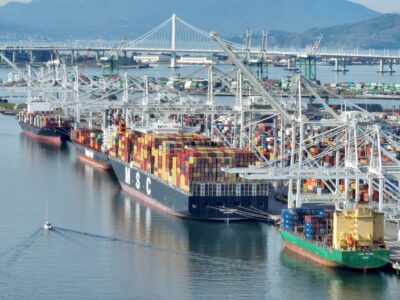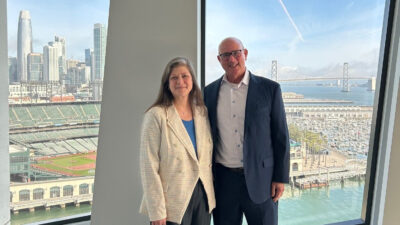Bay Area Council Employer Survey: 40% Expect Return to Workplaces Just Three Days a Week Post-Pandemic
The Bay Area commute may never be the same again, but what that means for the region’s highways and mass transit systems still remains to be seen. New data from a survey the Bay Area Council conducted of more than 200 employers found that most don’t expect workers to return to offices or other workplaces more than three days a week after the pandemic passes and restrictions lift.
The survey, one in a monthly series the Bay Area Council is conducting in partnership with the Metropolitan Transportation Commission and EMC Research, found that 40% of employers expect employees to return to their places of work three days a week after the pandemic passes while 13% expect workers to return four days a week and only 19% expect them to go back for a full five-day workweek. That compares with 93% of employers that said their workers commuted to a workplace four or five days a week before the pandemic. The July survey, administered between July 13-21, collected responses from 205 Bay Area employers of all sizes, industries and from all nine Bay Area counties.
See the full return to transit survey results>>
Extrapolating from the region’s overall pre-pandemic workforce, the survey findings suggest possibly an average of 1.1 million fewer commute trips to primary places of employment per day after COVID recedes into our rearview mirror. But the potential drop in commute trips doesn’t mean that traffic is going to be any less of a nightmare than before the pandemic.
“We’re seeing a potentially tectonic shift in the region’s commute patterns,” said Jim Wunderman, President and CEO of the Bay Area Council. “This could be good or bad news depending on how workers eventually choose to return to their commutes. As we move past COVID, it will be critical to do everything we can to get commuters back onto transit. Already, our transit agencies are taking extraordinary steps to restore service quickly and ensure public confidence in the health and safety of their systems. We have to keep the hammer down in working to restore public confidence in transit.”
Currently, the vast majority of workers returning to offices and other workplaces are driving automobiles. That explains why, even with an overall reduction in commuters since COVID hit, traffic congestion on some Bay Area bridges, highways and roads has largely returned to pre-pandemic levels. And while ridership on many mass transit systems, including BART, Caltrain and the SF Bay Ferry, is steadily increasing, it remains significantly below pre-pandemic levels.
“It would be a major mistake to conclude that increased remote work is an independent cure for traffic,” said Kelly Obranowicz, Policy and Regulatory Counsel for the Bay Area Council who focuses heavily on transportation issues. “42% of employers are reporting their employees currently are working remotely 100% of the time and yet we’re already seeing congestion hitting pre-pandemic levels on many days. Any traffic reduction gains we might hope to see from increased remote work will be wiped out if the commuters who are returning to workplaces are also choosing to commute by single occupancy vehicles in higher numbers than pre-pandemic.”
Much uncertainty remains about how the return to work will eventually play out. The survey found that just half of employers were “confident” or “very confident” that their responses for the number of days they expected workers returning to the workplace would hold. Still, employers are increasingly solidifying plans for some form of return to work, with 66% saying they have developed most or all of such plans, an increase from only 35% in April.





